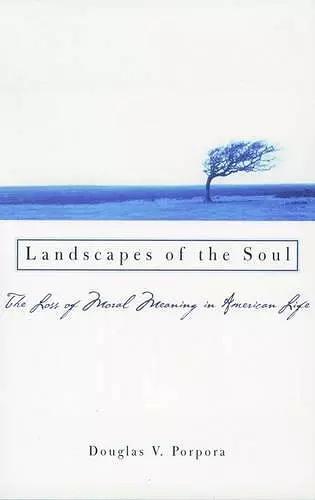Landscapes of the Soul
The Loss of Moral Meaning in American Life
Format:Paperback
Publisher:Oxford University Press Inc
Published:6th Nov '03
Currently unavailable, currently targeted to be due back around 25th January 2025, but could change

Do you believe in God? Nine out of ten Americans unhesitatingly answer yes. But for Douglas Porpora, the real questions begin where pollsters leave off. What, he asks, does religious belief actually mean in our lives? Does it shape our identities and our actions? Or, despite our professions of faith, are we morally adrift? Landscapes of the Soul paints a disturbing picture of American spiritual life. In his search for answers to his questions, Porpora interviewed clerks and executives, Jews, evangelical Christians, Buddhists, Taoists, and even followers of Bhagwan Sri Rajneesh. He asked them about God, and about what they saw as their own place in the universe. What he found was a widespread inability to articulate any grand meaning of life. We lack heroes to inspire us. We lack a sense of calling, of transcendent purpose in our existence. Many of us seem incapable of caring deeply about the suffering of others. Our society is permeated with moral indifference. Yes, we are a believing people, but God is often a distant abstraction and rarely an emotional presence in our lives. Only such an emotional connection, Porpora argues, can be the basis of a genuine moral vision. Our emotional estrangement from God and the sacred keeps us from caring about social justice, keeps us from wanting to change the world, keeps us enclosed in our own private worlds. Landscapes of the Soul is a passionate call to broaden our spiritual and moral horizons, to raise our eyes to the greater reality that unites us all.
"An astonishing mixture, a bold blend of diverse and spirited themes, all of which are food for famished hearts and hungry minds."--Christian Science Monitor
"Just may launch a national discussion of the important issues it raises."--Library Journal
"A provocative conversation starter."--Publisher's Weekly
"A book whose conversational tone allows a variety of voices to address fundamental questions...Porpora demonstrates the meaningfulness of local narrative, a proliferation of constructed spaces in a postmodern discourse, and evidence that postmodern people aren't necessarily theorists of postmodernism."--Booklist
"This book provides a powerful shock of recognition, delivered in easy doses through conversations with real people. Porpora enables us to look inside the trends Robert Putnam has so convincingly documented from the outside: the puzzle of how so many Americans can be decent and tolerant in private life yet unmoved by larger claims of justice and environmental destruction. Porpora argues that this puzzle cannot be comprehended on the social level alone. What is missing is emotional connection with the moral, philosophical, and ultimately sacred demensions of life, an insidious spiritual entropy of a kind very different from that denounced by self-styled 'conservatives.' It will leave readers not just more knowledgeable about the society they share, but uncomfortable with a merely passive relation to the questions the book explores."--William M. Sullivan, co-author of Habits of the Heart
"A fabulous, meticulously researched and scholarly account of the nature of religious beliefs and practice in America today. It is essential reading for all scholars and indeed all laypeople interested in the enduring phenomena of spirituality."--Roy Bhaskar, author of From East to West: Odyssey of a Soul
"Landscapes of the Soul updates and extends the work of Habits of the Heart. With rare lucidity, Porpora deftly interweaves his subjects' narratives with a realist theoretical analysis in an exceptionally readable book. He reveals the lunar landscape of the American soul, detached from the sacred, and shows poignantly that the profane offers no substitute. It condemns us to meaninglessness, to lives without ultimate concerns, passionate commitments or defining trajectories, lacking in heores and heroics alike. At most there remains a nostalgia for transcendence lost, which is too enervated to transcend its condition. Without proselytizing, Porpora sensitively allows a diverse handful of souls to articulate pathways out of the profane."--Margaret S. Archer, author of Culture and Agency: The Place of Culture in Social Theory
ISBN: 9780195169447
Dimensions: 155mm x 230mm x 23mm
Weight: 558g
368 pages